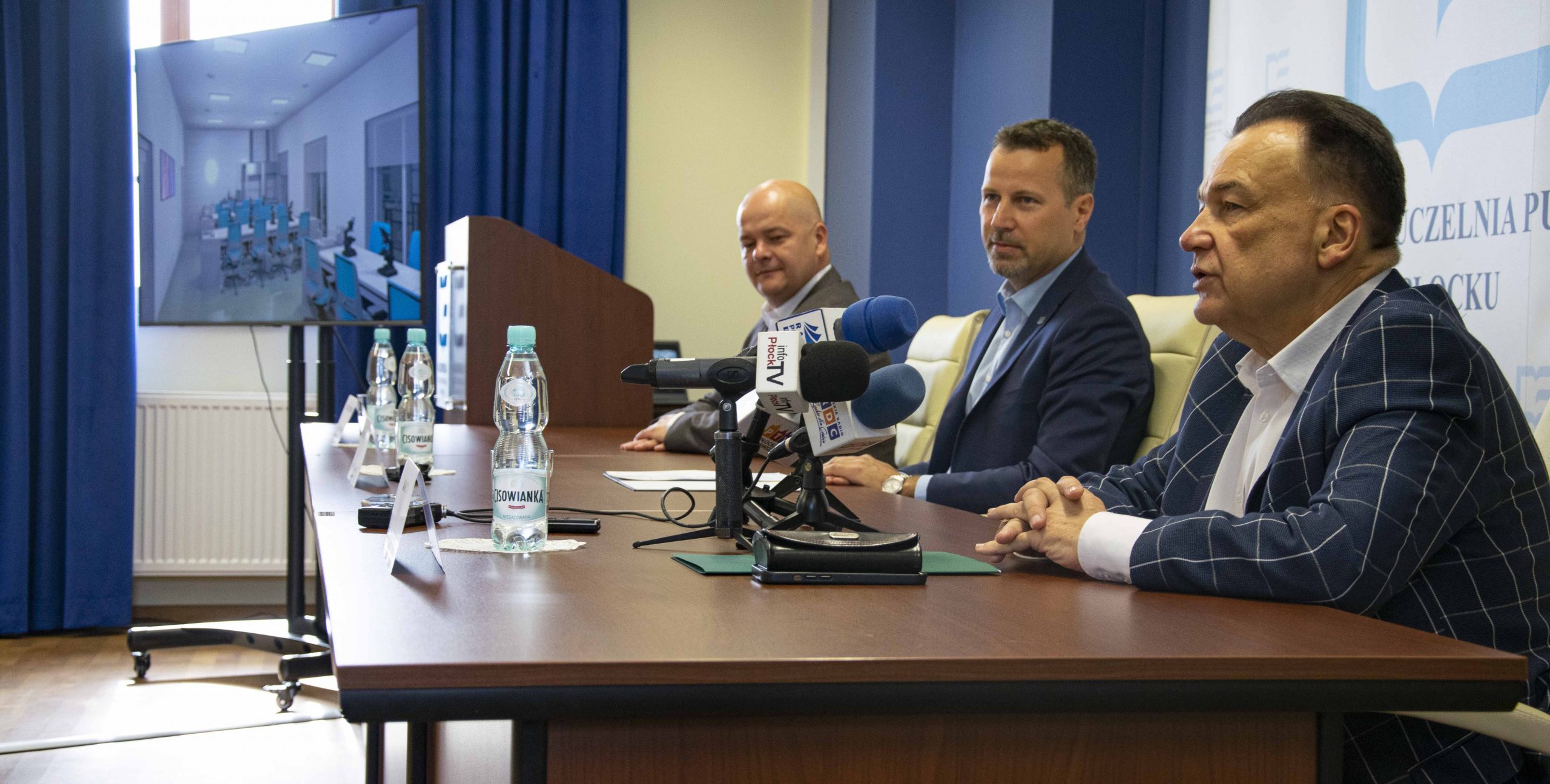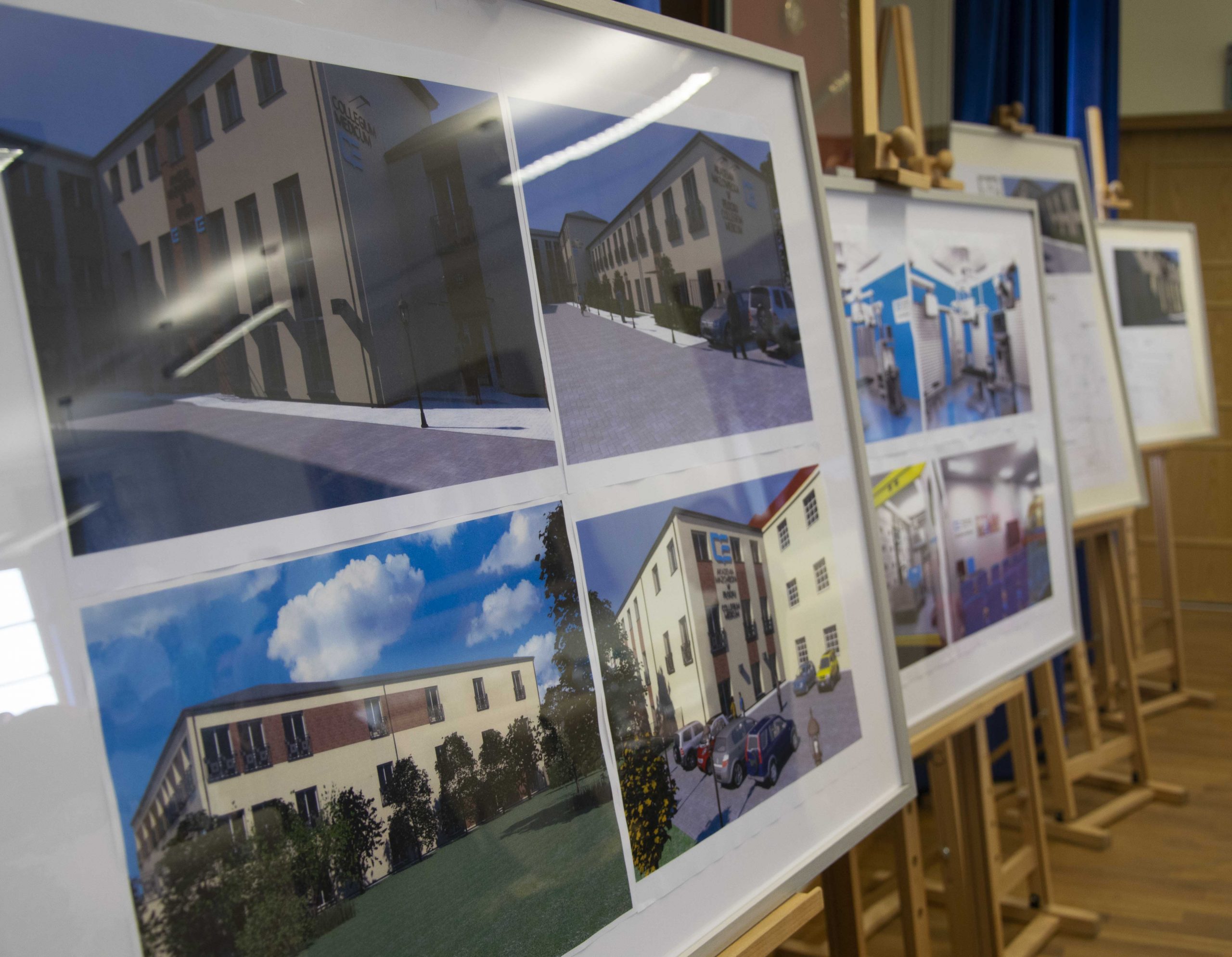
26.08.2022
In response to the application submitted on April 28, 2022, based on Resolution No. 598/2022 of the Polish Accreditation Commission Presidium dated July 21, 2022, the Mazovian Public University in Płock has received a positive opinion regarding the possibility of conducting studies in the field of medicine.
During a press conference on August 26, 2022, the University Rector, Professor Dr. hab. Med. Maciej Słodki informed that based on the positive opinion of the Minister of Health dated July 13, 2022, the Minister of Science and Education has issued a decision – a permit for the creation of a unified Master’s degree with a general academic profile in the field of medicine.
The Rector expressed his gratitude to Adam Struzik, Marshal of the Mazovian Voivodeship, and Andrzej Nowakowski, Mayor of the City of Płock, for supporting the initiative to start medical studies and declaring further support. He emphasized special recognition for Piotr Zgorzelski, Deputy Marshal of the Parliament of the Republic of Poland, and Marek Martynowski, Senator of the Republic of Poland, for supporting the legislative process.
„I believe that our joint efforts will result in improving the health situation in the Płock area,” emphasized Rector Maciej Słodki.
The Rector mentioned the extensive application to establish the studies, which was carried out by the efforts of those employed at the University. He particularly expressed gratitude for the contribution of work to Dr. hab. of health science Mariola Głowacka, Professor of the University.

Marshal Adam Struzik congratulated Rector prof. dr hab. med. Maciej Słodki on his initiative and success, appreciating his determination and knowledge. „You are the author of this success,” emphasized the Marshal, ensuring further support and cooperation.
The Mayor of the City of Płock, Andrzej Nowakowski, also congratulated Rector Maciej Słodki and the Dean of the Health Sciences Faculty, Mariola Głowacka.
„This is a unique moment in the history of Płock, but also the beginning of the journey. Without the engagement and belief of the Rector, the goal for many would have been unavailable,” emphasized Mayor Nowakowski, thanking for the invitation to cooperate and declaring further support.

During the meeting, the rector also presented the project of the newly established Collegium Medicum, a new educational base for the training of future medical staff, which is being prepared and supervised by MSc. Eng. Marcin Zawadka, Head of the University Administration Department.
Marshal Struzik mentioned the new EU budget, containing a component supporting educational processes and possible support for university investments.

The project to create a medical degree at the Mazovian Public University in Płock is a response to the important social need to increase access to medical services for residents of Płock, Mazovia, and Poland. The current epidemic situation in the country and the world, particularly the SARS-CoV-2 pandemic, has highlighted the growing shortages in the medical profession in Polish medical facilities. Poland has one of the lowest (2.4) employment rates of doctors in the European Union (3.6). The unfavorable situation is also influenced by the age structure, professional migration, and excessive workload of doctors. In 2016, the Supreme Audit Office in its report emphasized that the number of medical graduates is insufficient. Meanwhile, the report „Shortage of talents in the medical industry” by the Polish Federation of Hospitals and Manpower Agency states that currently, 68% of hospitals are looking for doctors. This was confirmed by the Chairman of the National Trade Union of Doctors in 2021, informing that more departments are being closed due to staff shortages, and others are balancing on the edge of operation. Data from the Płock region shows that currently 2.2 doctors per 1000 residents, which is less than the national average and twice less than in the Mazovian Voivodeship.
The support for the initiative to launch a medical program at the Mazowiecka University of Public Health in Płock was given by the following: The Strategic Council for the Launch of the Medical Program, Bishop Piotr Libera of the Płock Diocese, Marshal Adam Struzik of the Mazovian Voivodeship, and Mayor Andrzej Nowakowski of the City of Płock. In addition, the proposal was supported by the County Governor of Płock, the County Governor of the Sierpec, the County Governor of the Gostynin, the Mayor of the City of Gostynin, the President of the Regional Medical Chamber in Płock, the Chairman of the Regional Council of Nurses and Midwives, the Director of the Provincial Hospital Complex in Płock, the President of the Płock Health Care Facility, the Vice-President of the Borowiczki Medical Center Board, and the Director of Arion Med. Sp. z o.o. in Gostynin.
Statements of cooperation in terms of providing medical facilities for clinical activities and their possible transformation into clinical departments, as well as willingness to accept students for professional practices, were made by: The Director of the Voivodeship Hospital Complex in Płock, the President of the Płock Health Care Facility, the President of the Płock Hospice, the Director of the Voivodeship Independent Public Health Care Facility in Gostynin, the Director of the Voivodeship Emergency Medical Service and Ambulance Transport.
The Mazovian University of Public Health in Płock has been offering medical and health science programs since 2011, including nursing (first-degree studies – since 2011; second-degree studies – since 2017), midwifery (first-degree studies – since 2017), and cosmetology (first-degree studies – since 2013). Students are very interested in those studies.
The launch and development of the medical program are consistent with the assumptions of the Health Sciences Development Strategy and with the dynamic progression of medical professions, mainly by expanding the scope of competence and independence requiring interdisciplinary education.
The Mazovian Public University in Płock has a modern teaching base, providing the possibility of conducting classes and achieving learning outcomes in terms of knowledge, skills, and social competencies. It has two Monoprofile Medical Simulation Centers. Another educational complex, the Collegium Medicum, is being created, a three-story building with workshops, classrooms, simulation rooms: a virtual reality room, an operating room block (operating room, preparation room, operating room, recovery room), an ambulance room, a hospital emergency department, two control rooms for these rooms (close to 2000 m2). The development of the Medical Simulation Center will allow for part of the learning outcomes to be achieved from the level of unified master’s studies in medicine using high-fidelity simulators and will expand the possibilities for conducting scientific research. It will also be a good area for multidisciplinary cooperation with external entities.

The University has accommodation for visiting students, offering places in the Student House.
Studies in medicine will be conducted in the leading medical science discipline at the level of a unified master’s degree, with a general academic profile and full-time studies. The expected number of students per year is 60 people.
